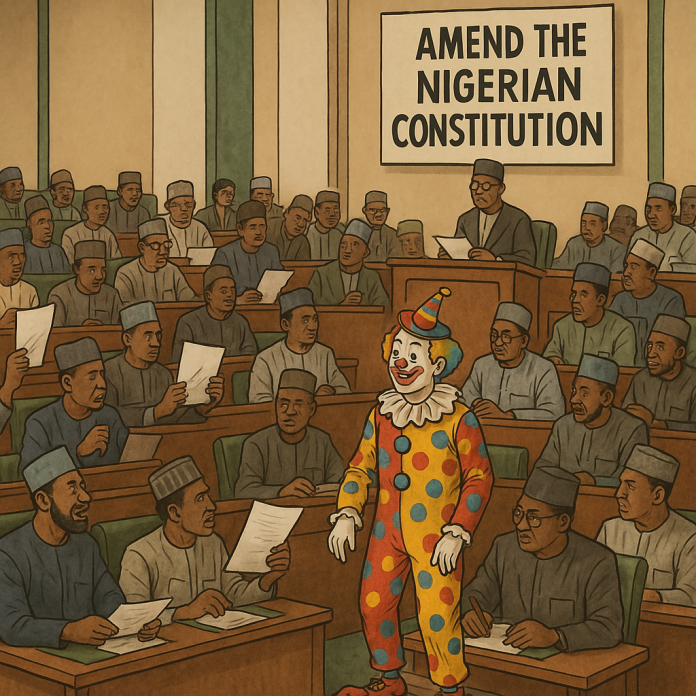By BUKAR Mohammed
The Nigerian Constitution, like any other, is a living document intended to evolve with the country’s sociopolitical and economic realities. However, the constitutional amendment process has often been more of a spectacle than a genuine effort to address the nation’s pressing governance challenges. The National Assembly, particularly the House of Representatives, periodically introduces and passes amendments that sometimes seem more about political maneuvering than meaningful reform. This article critically examines recent constitutional amendments, their implications, and whether they serve as genuine solutions or mere distractions.
The Necessity of Constitutional Amendments
Constitutions are not static; they require periodic amendments to reflect societal progress, resolve ambiguities, and address emerging governance challenges. Nigeria’s 1999 Constitution, a military-imposed document, has been criticized for several inadequacies, including:



The amendment process, therefore, is essential to ensuring that the constitution remains relevant and responsive to Nigeria’s dynamic realities.
Recent Amendments: A Critical Review
1. Financial Autonomy for State Legislatures and Judiciary
One commendable amendment has been the push for financial autonomy for state legislatures and the judiciary. By ensuring these arms of government receive their allocations directly from the federal purse, the amendment aims to reduce executive interference at the state level. However, implementation has been weak, with many governors finding ways to maintain control over funds, undermining the amendment’s intent.
2. Local Government Autonomy: A Tug-of-War
Another notable attempt is the amendment seeking full autonomy for local governments by preventing state governors from controlling their funds. While widely supported, the amendment has repeatedly hit a brick wall at the state level, where governors—wielding significant influence over state assemblies—have refused to endorse it. This exposes a hypocrisy within Nigeria’s democracy: while lawmakers champion reforms at the national level, their counterparts at the state level sabotage them.
3. Gender Equity and Representation: Empty Gestures?
Proposals to increase women’s representation in governance by reserving specific legislative seats for women were progressive but ultimately rejected by many lawmakers. This reflects deep-seated resistance to gender inclusion and highlights how some amendments are mere political posturing rather than serious commitments to change.
4. Diaspora Voting: A Stillborn Reform
The proposal to allow Nigerians in the diaspora to vote has been on the table for years. Given Nigeria’s large and economically influential diaspora community, this amendment could enhance electoral credibility and inclusivity. However, despite repeated discussions, the House has failed to pass it, citing logistical and security concerns. This resistance suggests a reluctance to expand democratic participation, likely driven by fears that diaspora votes could disrupt existing political calculations.
5. Electoral Reforms: Lip Service or Genuine Change?
Among the most anticipated amendments was the push for electoral reforms, including the electronic transmission of results. While the National Assembly initially supported this move, political interests diluted the final outcome. The inability to enforce stricter electoral laws has allowed continued manipulation of elections, raising questions about whether these amendments are genuine or merely for public relations.
Key Amendments and Their Implications
 Removal of Immunity for Governors and the Vice President
Removal of Immunity for Governors and the Vice President
Pros: Enhances transparency and accountability by allowing legal actions against these officials while in office, potentially curbing corruption.
Cons: May expose political leaders to frivolous lawsuits, potentially disrupting governance and policy implementation.
 Simultaneous General Elections
Simultaneous General Elections
Aims to hold all elections (presidential, gubernatorial, National Assembly, and state legislative) on the same day to reduce electoral costs and streamline the process.
Critique: While promoting efficiency, it may overwhelm INEC and security agencies, making election management more challenging.
 State and Local Government Police
State and Local Government Police
Seeks to establish state and local police forces to enhance grassroots security.
Critique: While it may improve security, concerns remain about possible abuse of power by state governors, especially in opposition-controlled areas.
 FCT House of Assembly
FCT House of Assembly
Proposes a legislature for the Federal Capital Territory (FCT) to enhance self-governance.
Critique: Critics argue it may increase governance costs and create conflicts between the FCT government and the National Assembly.
 Resolution of Election Appeals Before Swearing-in
Resolution of Election Appeals Before Swearing-in
Ensures that all election petitions are resolved before elected officials take office.
Critique: This could lead to prolonged electoral disputes, delaying governance, but ensures that only legally elected officials assume power.
INEC to Conduct Local Government Elections
Shifts responsibility from state electoral bodies to INEC to improve election credibility.
Critique: While enhancing fairness, states may resist, citing encroachment on their autonomy.
Defection Rules for Lawmakers
Requires legislators to resign before switching parties, preventing opportunistic defections.
Critique: This could reduce political instability but may limit lawmakers’ ability to act based on evolving political realities.
Financial Autonomy for the Auditor-General
Strengthens the independence of the Auditor-General’s office for better financial oversight.
Critique: While positive, corruption risks may persist without strong enforcement mechanisms.
Expansion of the Supreme Court
Increases the number of justices to improve efficiency.
Critique: May reduce case backlog but could raise concerns about political influence in judicial appointments.
Are These Amendments Mending or Mocking the Constitution?
While some amendments have the potential to strengthen Nigeria’s democracy, many have been clownish in execution. The House of Representatives often engages in performative lawmaking—introducing popular amendments that either lack enforcement mechanisms or are dead on arrival due to political opposition.
Key Criticisms:




Conclusion
Constitutional amendments should serve as tools for genuine reform, not as instruments for political grandstanding. The House of Representatives, despite its periodic efforts, has often approached constitutional amendments with a mix of unseriousness and opportunism. If Nigeria is to have a truly functional democracy, lawmakers must move beyond theatrics and commit to real, enforceable changes. Until then, many of these amendments will remain more of a mockery than a mend.
BUKAR Mohammed is a public analyst from Kano.
Share your story or advertise with us: Whatsapp: +2347068606071 Email: info@newspotng.com

















